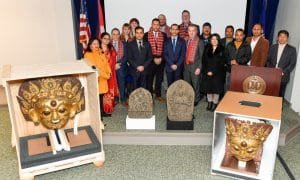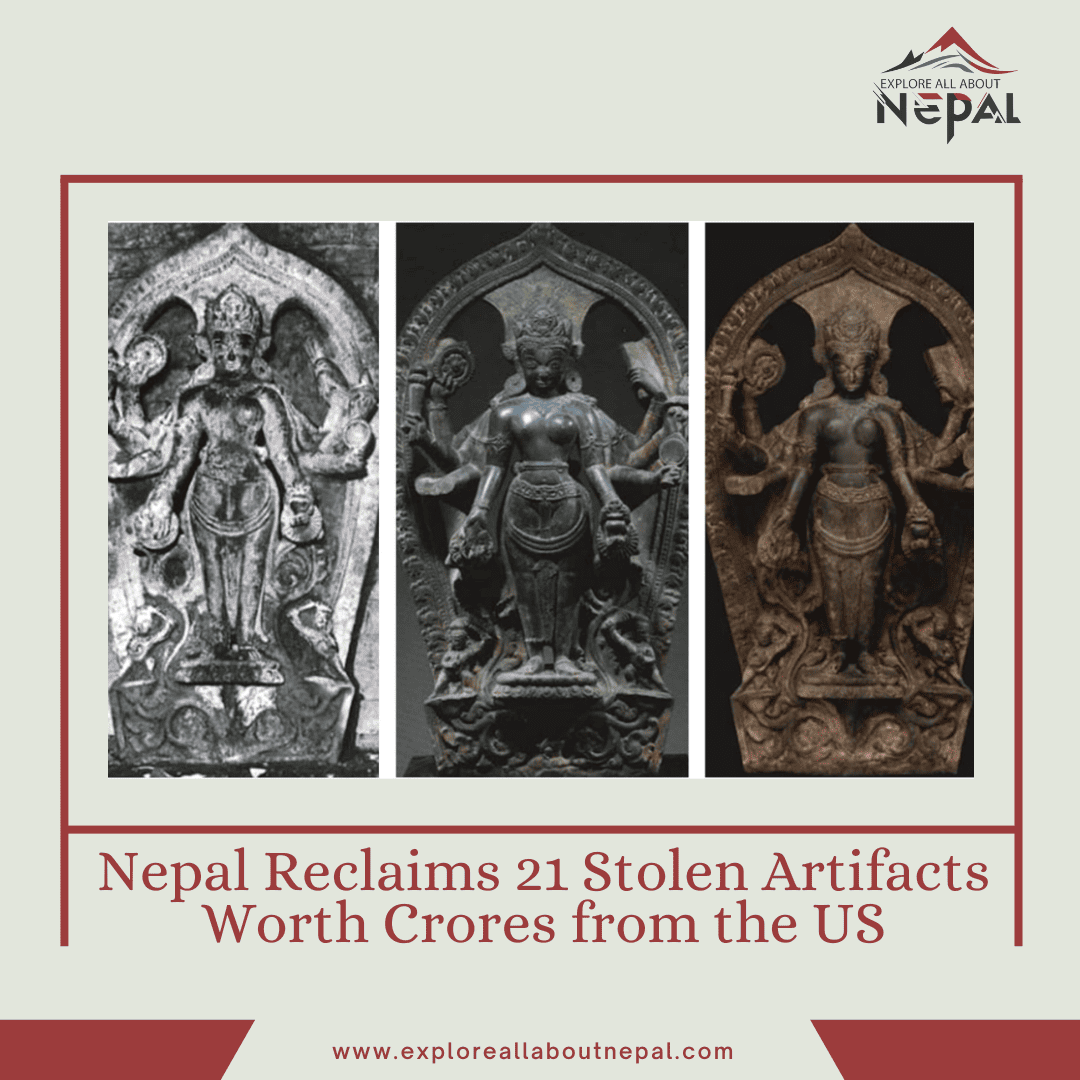Nepal Reclaims 21 Stolen Artifacts refers to Nepal successfully recovering 21 cultural and historical artifacts that were illegally taken from the country and later found in the United States. These artifacts, which include ancient statues, religious relics, and sculptures, hold immense cultural, religious, and historical significance. Their return is part of Nepal’s ongoing efforts to reclaim stolen heritage and prevent the illegal trafficking of its cultural assets.
Nepal has successfully reclaimed 21 stolen artifacts from the United States, marking a significant victory in the country’s ongoing efforts to recover its lost cultural heritage. These artifacts, which include ancient statues and religious relics, hold immense historical and cultural value. This achievement is part of Nepal’s broader initiative to reclaim stolen heritage items that have been smuggled out of the country over decades.

Background: Nepal’s Stolen Heritage
For years, Nepalese artifacts have been targeted by smugglers and sold in the international black market. Many of these items date back to centuries-old civilizations, representing Nepal’s deep cultural and religious traditions. Theft and illegal trade of cultural artifacts became widespread, particularly during the political instability of the late 20th century.
Organizations, historians, and government bodies have long been advocating for the return of these stolen artifacts. The Nepalese government, in collaboration with international agencies, has been actively working to track and reclaim these cultural treasures.
The Return of 21 Artifacts from the US
How Were the Artifacts Recovered?
The recent return of 21 stolen Nepalese artifacts from the US was made possible through the combined efforts of:
- Nepal’s Department of Archaeology
- Nepal’s Ministry of Culture, Tourism, and Civil Aviation
- The US government, including the Manhattan District Attorney’s Office
- International organizations dedicated to protecting cultural heritage
- Museum and art collectors who voluntarily returned stolen pieces
These recovered artifacts had been housed in various museums and private collections across the US. Investigations revealed that they were illegally acquired, leading to their return to Nepalese authorities.
The Most Notable Recovered Artifacts
Among the 21 returned artifacts, some of the most significant pieces include:
- A 10th-century Uma Maheshwor statue – An important Hindu deity sculpture, stolen from a temple in the Kathmandu Valley.
- A 12th-century Avalokiteshvara statue – A representation of the Bodhisattva of Compassion, taken from a heritage site in Patan.
- Buddha sculptures from the 14th century – Sacred Buddhist relics that were illegally transported abroad.
- Ancient wooden carvings and temple decorations – Many of which were part of Nepal’s historic pagodas and shrines.
The Role of Nepal’s Government and International Collaboration
The Nepalese government has played a crucial role in ensuring the return of these artifacts. The efforts include:
- Strengthening diplomatic ties with the US and other countries
- Collaborating with international cultural organizations like UNESCO
- Enhancing security measures at heritage sites to prevent further theft
- Raising public awareness about the importance of cultural heritage preservation
US authorities, especially the Manhattan District Attorney’s Office, have also been instrumental in identifying and repatriating stolen artifacts. Several museums and collectors in the US have cooperated voluntarily, acknowledging the importance of returning Nepal’s cultural heritage.
Why This Recovery is Significant for Nepal
1. Cultural and Religious Importance
These artifacts are more than just historical objects; they hold deep spiritual and cultural significance for Nepalese communities. Their return restores a piece of Nepal’s heritage that was lost for decades.
2. Boost to Nepal’s Heritage Tourism
With these artifacts back in Nepal, museums and heritage sites can attract more visitors, boosting the country’s cultural tourism industry. Many tourists visit Nepal not just for its natural beauty but also to experience its rich history and traditions.
3. A Stronger Stand Against Art Smuggling
The successful repatriation sends a strong message to art smugglers and illegal traders. It demonstrates Nepal’s commitment to protecting its cultural heritage and holding those responsible accountable.
Nepal’s Ongoing Efforts to Reclaim Lost Artifacts
Nepal continues to work towards the recovery of other stolen artifacts scattered across various countries. Some of the initiatives include:
- Collaborating with museums worldwide to identify stolen Nepalese artifacts
- Using digital tools and databases to track stolen items in international collections
- Seeking legal measures to reclaim heritage items through international courts and agreements
- Encouraging Nepalese citizens and researchers to report stolen or missing artifacts
Challenges in Reclaiming Stolen Artifacts
Despite recent successes, reclaiming lost cultural treasures remains a challenging task. Some of the key obstacles include:
- Lack of proper documentation – Many stolen artifacts were taken during times when record-keeping was weak.
- Resistance from collectors and museums – Some institutions are reluctant to return artifacts, claiming they were acquired legally.
- Legal and diplomatic hurdles – The process of repatriation often involves lengthy legal battles and diplomatic negotiations.
The Future of Nepal’s Cultural Heritage Preservation
The return of these 21 artifacts is just the beginning. Nepal is taking significant steps to protect its cultural heritage, including:
- Strengthening laws against artifact smuggling
- Enhancing security at heritage sites
- Increasing public awareness and education on cultural heritage
- Partnering with international organizations for continued support
Highlights
Conclusion
Nepal’s successful reclamation of 21 stolen artifacts from the US marks a historic moment in the country’s fight against cultural theft. These artifacts, valued in crores, are not just pieces of history but symbols of Nepal’s rich cultural and religious legacy. As Nepal continues its mission to recover lost treasures, international cooperation, awareness, and stronger legal frameworks will be key to ensuring that Nepalese heritage remains protected for future generations.


